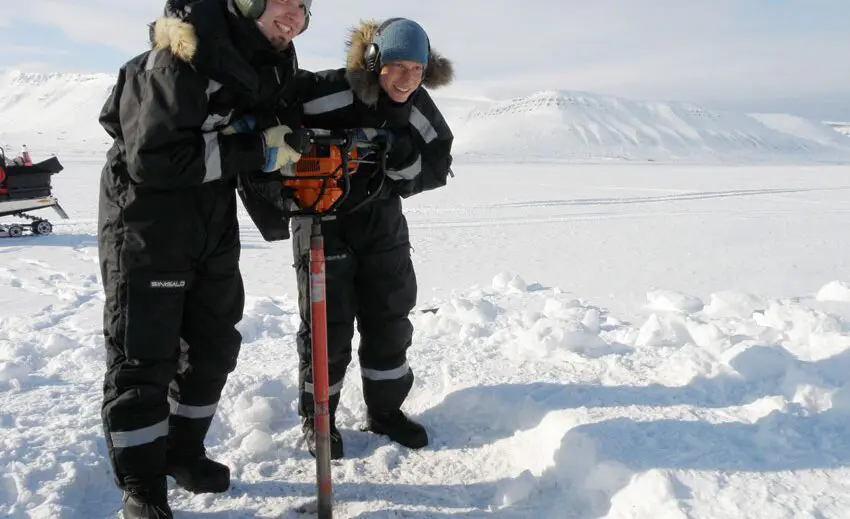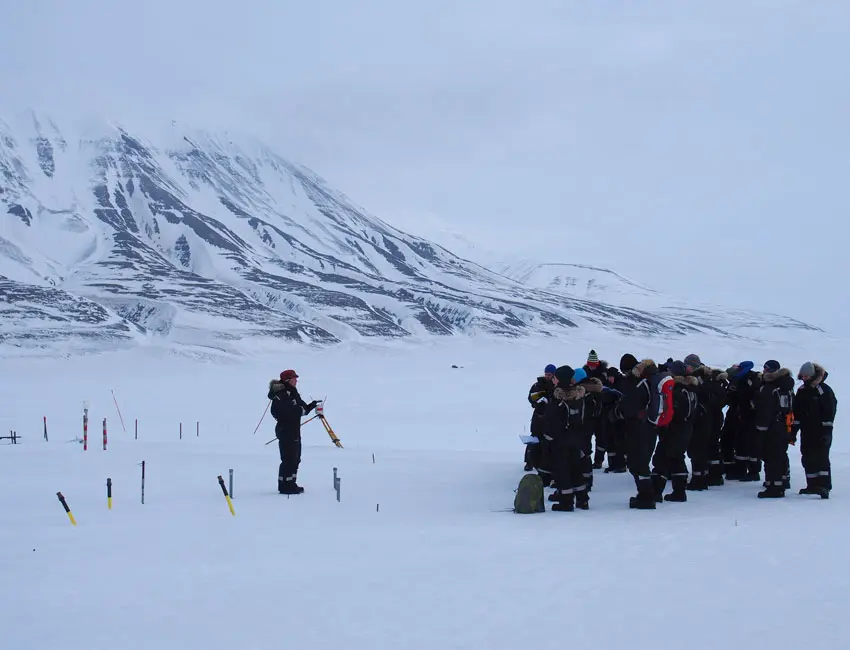AG-830 Permafrost and Periglacial Environments (10 ECTS)
ID:
AG-830
CREDITS:
10 ECTS
APPLICATION DEADLINE:
October 01, 2024
START DATE:
April 22, 2025
END DATE:
June 06, 2025
COURSE PERIOD:
Spring semester, teaching block 3 - Cancelled in 2025

AG-330/830 students drilling in the permafrost in Svalbard. Photo: Hanne H. Christiansen/UNIS.
| Grade: | Letter grade (A through F) |
| Course Cost: | None. All fieldwork will be one-day based out of Longyearbyen |
| Course Capacity Min/Max: | 10/20 students (AG-330/830 in total) |
| Language of instruction: | English |
| Course materials: | Curriculum/reading list: app. 200 pages |
| Examination support material: | Bilingual dictionary between English and mother tongue |
Course requirements
Enrolment in a PhD programme in Physical Geography, Quaternary Geology or other relevant Geoscience programme.
Academic content
The course has a specific focus on the interaction between permafrost, periglacial processes and climate, and how this interaction controls the different periglacial landforms. The course will give an insight into modern research methods, including field methods and theoretical approaches to understanding processes and impacts of climate on periglacial landforms. The theoretical part will introduce permafrost basics, periglacial geomorphology, and the meteorological control on the permafrost distribution and the activity of periglacial processes and landforms. The course will focus on Arctic and alpine landscapes.
Seminars will deal with papers based on field studies in Svalbard or other cold-climatic regions, to improve the understanding of geomorphological processes, and to demonstrate the use of periglacial landforms to reconstruct past environments and climatic conditions. Discussions will concentrate on identifying the critical questions for future permafrost and periglacial research, and how procedures might be devised to address these questions.
Learning outcomes
Upon completing the course, the students will:
Knowledge
- A comprehensive advanced understanding of geomorphic processes in regions with permafrost and periglacial landforms, exemplified by Svalbard.
- Knowledge and understanding of the geomorphological complexities of cold-climate landscapes.
- Insight into modern research methods and theoretical approaches to understanding processes and impacts of climate on periglacial landforms.
Skills
- Skills in various field and mapping techniques, and methods of data interpretation.
- Training in the ability to combine theory with field methods and observations.
- A capability of analysing existing theories and to plan personal research using relevant methods.
General competences
- Critical thinking and evaluation of scientific literature on permafrost and periglacial processes
- Discovering knowledge by own means, and retaining this knowledge
- Perceiving relations between old and new knowledge, and applying this effectively to solve new scientific problems.
- Be able to communicate and critically evaluate research.
- Group working skills.
- Arctic winter field skills.
Learning activities
The course extends over 6 weeks including compulsory safety training, and is run in combination with AG-330 Permafrost and Perglacial Environments (10 ECTS).
The course will have a theoretical part with lectures and seminars, and a practical part with excursions and fieldwork. The practical part will emphasize field methods relevant to permafrost-related research such as geomorphological mapping techniques, drilling in permafrost and installation and operation of sensors and data loggers for measuring temperature and other parameters of the active layer and top permafrost. There will be field excursions to permafrost monitoring sites, rock glaciers, talus sheets, ice-wedges, pingos and rock free faces to visit on-going research projects and for collection of field data. The fieldwork and excursions may be subject to changes, depending upon the weather conditions.
Summary
- Total lecture hours: 30 hours.
- Exercises: 20 hours.
- Fieldwork or field excursions: 4 days.
Compulsory learning activities
All compulsory learning activities must be approved in order to sit the exam.
- Fieldwork
- Field excursions
- Field and laboratory exercises
- Oral presentation of group field report
- Scientific paper presentations
Assessment
- All assessments must be passed in order to pass the course.
- Each assesment is graded, and subsequently combined into a single grade. Partial for each assesment will be available.
| Method | Duration |
Percentage of final grade
|
| Oral presentation of chosen topic | 33% | |
| Written exam | 4 hours | 67% |
Student life


